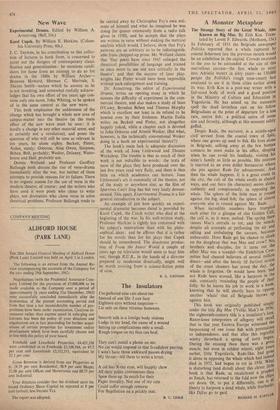New Wave
Experimental Drama. Edited by William A. Armstrong. (Bell, 16s.)
J. C. TREWIN, in his contribution to this collec- tion of lectures in book form, is concerned to point out the dangers of contemporary classi- fication and generalisation : he mentions candi- dates for fame from an attempt to do so for drama in the 1880s by William Archer— Bronson Howard, Herman C. Merivale, S. Theyre Smith—names which he assures us he is not inventing, and somewhat ruefully acknow- ledges that his own effort of ten years ago con- tains only one name, John Whiting, to be spoken of in the same context as the new wave.
This both emphasises the suddenness of the change which has brought a whole new area of subject-matter into the theatre (as the main effect of the new wave must be seen: it is hardly a change in any other material sense, and is certainly not a revolution), and poses the question of who will still be seen as relevant in ten years, let alone eighty. Beckett, Pinter, Arden, surely; Osborne, Alun Owen, Simpson, Behan, Bolt, probably; Wesker, Delaney, Water- house and Hall, probably not.
Dennis Welland and Professor Geoffrey Bullough both discuss the rise of verse-drama immediately after the war, but neither of them attempts to provide reasons for its failure. There is no organic reason for the use of verse in the modern theatre, of course: and the writers who have used it were poets who chose to write plays, not dramatists who chose verse to solve theatrical problems. Professor Bullough tends to be carried away by Christopher Fry's own esti- mate of himself and what he imagined he was doing (he quotes extensively from a radio talk given in 1950), and he accepts that the plays are written in verse without making the metrical analysis which would, I believe, show that Fry's patterns are so arbitrary as to be indistinguish- able from chopped-up prose. Mr. Welland claims that 'Our poets have since 1945 enlarged the theatrical possibilities of language and trained us once more to use our ears critically in the theatre'; and that the success of later play- wrights like Pinter would have been impossible without such enlargement and training.
Dr. Armstrong, the editor of Experimental Drama, writes an opening essay in which he stresses the difficulty of experiment in the com- mercial theatre, and also makes a study of Sean O'Casey, Brendan Behan and Thomas Murphy which is excellent not least in its refusal to be bowled over by their Irishness. Martin Esslio writes on Beckett and Pinter, not altogether happily yoked, while a chapter each is devoted to John Osborne and Arnold Wesker. (But what, however, is the technically conventional Wesker doing in a book on experimental theatre?) The book's main lack is adequate discussion of the work of Joan Littlewood and Theatre Workshop. The trouble is that so much of their work is not reducible to words : the texts of most of the plays they have produced over the last five years read very flatly, and there is thus little on which academics can lecture. Joan Littlewood's art is essentially of the theatre, not of the study or anywhere else; as the film of Sparrows Can't Sing has but very lately demon- strated. This apart, Experimental Drama is a fair general introduction to the subject.
An example of just how quickly an experi- mental dramatist becomes dated is provided by Karel Capek, the Czech writer who died at the beginning of the war. In his well-written study, Professor Harkins is rightly less concerned with his subject's innovations than with his philo- sophical ideas: and he affirms that it is rather for his novels than for his plays that Capek should be remembered. The disastrous produc- tion of From the Insect World a couple of years ago on television would seem to bear him out; though R.U.R., in the hands of a director prepared to modernise drastically, might well be worth reviving from a science-fiction point of view.
B. S. JOHNSON


































 Previous page
Previous page